- Home
- Sharon Bolton
Little Black Lies
Little Black Lies Read online
The author and publisher have provided this e-book to you for your personal use only. You may not make this e-book publicly available in any way. Copyright infringement is against the law. If you believe the copy of this e-book you are reading infringes on the author’s copyright, please notify the publisher at: us.macmillanusa.com/piracy.
Contents
Title Page
Copyright Notice
Dedication
Map
Epigraph
Part One: Catrin
Chapter 1
Chapter 2
Chapter 3
Chapter 4
Chapter 5
Chapter 6
Chapter 7
Chapter 8
Chapter 9
Chapter 10
Chapter 11
Chapter 12
Chapter 13
Part Two: Callum
Chapter 14
Chapter 15
Chapter 16
Chapter 17
Chapter 18
Chapter 19
Chapter 20
Chapter 21
Chapter 22
Chapter 23
Chapter 24
Chapter 25
Part Three: Rachel
Chapter 26
Chapter 27
Chapter 28
Chapter 29
Chapter 30
Chapter 31
Chapter 32
Chapter 33
Chapter 34
Chapter 35
Chapter 36
Chapter 37
Chapter 38
Chapter 39
Author’s Note
Bibliography
Acknowledgements
Also by Sharon Bolton
About the Author
Copyright
For Anne Marie, who was the first to tell me I could do it; and for Sarah, who makes me do it better
Ah! well a-day! what evil looks
Had I from old and young!
Instead of the cross, the Albatross
About my neck was hung.
Samuel Taylor Coleridge, The Rime of the Ancient Mariner
PART ONE
Catrin
I’ve been wondering if I have what it takes to kill. Whether I can look a living creature in the eye and take the one irreversible action that ends a life. Asked and answered, I suppose. I have no difficulty in killing. I’m actually rather good at it.
DAY TWO
Tuesday, 1 November 1994
1
I believe just about anyone can kill in the right circumstances, given enough motivation. The question is, am I there yet? I think I must be. Because lately, it seems, I’ve been thinking of little else.
It is a minute after midnight. In two days’ time it will be the third of November. Two more days. Am I there yet?
Something is moving. Not the water surrounding me, that seems frozen in time, but the reflection of a bird. I don’t need to glance up to see that it’s a giant petrel. Massive, prehistoric-looking beasts with their six-foot wing span and their huge curving beaks, they often follow the boat, especially when I’m out at night, keeping pace with me however far I go or how fast I drive.
I’m not driving now. I’m sitting in the cockpit, staring at a photograph of my two sons. I must have been doing so for some time because my eyes are stinging. I squeeze them shut, then force myself to look away.
In the distance, the mountains are dark against a paler night sky and the water around me has the appearance and texture of an old glass mirror. Still, flawed in places, not quite translucent. It does this at times, this ocean, assumes a character so unlike itself as to take you momentarily unawares, make you forget that it’s one of the harshest, least forgiving seas in the world.
I’m anchored off the coast of the Falkland Islands, a tiny archipelago in the South Atlantic Ocean, so distant from everywhere that matters, so unimportant on the world stage, that for centuries it escaped just about everybody’s attention. And then it became the discarded bone over which two ego-driven dogs of politics picked a fight. For a few brief weeks the whole world knew about us. That was over a decade ago and the world soon forgot.
We don’t forget though, and neither does Argentina. Every so often, even twelve years after it had its ass kicked, the Argentine government casts a leery eye in our direction. The Argentinians say the Islas Malvinas belong to them. We say ‘up yours’.
Not that we’re so very happy to be what we’ve become: an expensive indulgence, one of the last remaining scraps of the British Empire. We long for independence, for the income to fund our own defence. The hope is a faint one. And we never feel safe.
The photograph of my sons has faded. It’s not so obvious now but in the daylight the red of Kit’s jacket will be a dull pink, Ned’s yellow boots a sickly cream colour.
On the water, the reflected moon is so still and perfect that it might have fallen, whole and undamaged, from the sky. It lies a little way off the stern, as slender and unsubstantial as a sliver of wood shaving. Stars are scattered around it like litter, as though someone has sprinkled them randomly over the surface of the ocean. There is no light pollution in this far corner of the South Atlantic, and every star in the sky tonight is reflected directly below me. I seem surrounded by stars. When I lived briefly in the cities of the northern hemisphere, where the stars are pinpricks of light, sometimes invisible entirely, it was easy to forget their sheer number. Back home, every time I come out upon the ocean at night, I’m reminded of the vastness of the sky.
I rouse myself, not sure how long I’ve been sitting here, but knowing I have another twenty minutes or so of work to do before I’m done for the night. I change the tank, check the oxygen levels, put my mask and mouthpiece in place and step off the back of the boat.
Instantly the water wraps its cold blanket around me, chilling me in spite of the protective wetsuit I’m wearing, but I never mind this. I think of it as part of the acclimatization process, the transformation I have to undergo from land crawler to sea creature.
The water isn’t deep, twenty metres at most. Of course I shouldn’t dive by myself. I’m breaking the first rule of safety among divers even by being on the boat alone, but there is no one alive any more with either the authority or the influence to stop me, and I have little interest in safeguarding myself.
I look down, see the dive-line descending, disappearing into the darkness, then I let air out of my jacket and sink. A few feet down, I flip and start swimming towards the kelp forest that is coming into view below me.
Kelp, what most people call seaweed, grows in abundance here. Anchored to the seabed with a root-like structure, it stretches towards the light, its fronds and tendrils kept upright by gas-filled floats.
A boat was wrecked here, long ago, and since then the entire structure has broken apart to form the majestic, sub-marine architecture of the ocean floor. Huge pieces of wood, colonized by sea life, soar up from the seabed like underwater cities. Above it all, like an ancient forest, only one in constant, graceful motion, towers the kelp.
I reach its tip and continue down. In daylight, in clear conditions, the sheer brilliance of the colours around me would be astonishing. At night, seen only with the aid of my torch, they are softer, more muted. The custard of the kelp, the deep, smoky blue of the water, the occasional flashes of ruby red as crabs scuttle across the sand.
I am collecting samples of sea urchin. The kelp forests are important fish spawning areas but recently they’ve been in decline and one possible culprit is the sea urchin that eats away at their roots. The people I work with need to know if some new, invasive species is at large, or whether the normal population has just become a bit greedier. Potentially, selling fishing licences
could be enormously lucrative for the islands’ economy. The fish matter, so the kelp forests matter, so my urchins matter. Overnight, they’ll be stored in refrigerated containers on the boat; in the morning I’ll take them to my lab in Stanley.
A couple of metres from the ocean floor, I make my way along a path I’ve already committed to memory. Many divers don’t like the kelp. They’re repulsed by the wet plant life brushing past them; they dread the occasions when it wraps itself, tendril-like, around limbs. I like the feeling of security it gives me. I enjoy being concealed, taking other creatures by surprise, sometimes being taken by surprise myself. My scavenging missions are always more successful when I am among kelp.
Suddenly, I realize I’m not alone down here. The kelp in front of me is moving at odds with the gentle sway of the waves. Something is coming towards me. A second later a young fur seal and I are practically nose to nose. It looks into my eyes then darts away again, following a fish that is moving too fast for me to note its species. I watch them zigzag across the ocean floor, but the feeling of unease doesn’t leave me.
It happens in an instant. A great shadow looms overhead, the water is pushed back against me with huge force, and a massive creature dives past after the seal. They make contact. There’s a frenzied squirming and tossing of flesh. The water erupts in an explosion of bubbles, then the two creatures break apart again.
The newcomer is an elephant seal, a large male, over two metres long. It is much slower than the fur seal but exceptionally strong. They begin a frantic chase through the kelp and I am in danger.
An elephant seal wouldn’t normally attack a human, it wouldn’t even bother a big seal, but this one is locked into the hunt, driven by the need to kill. The water around me is already stained with the young seal’s blood. If it escapes and the elephant spots me, it may just act without thinking. I freeze, crouched low in the kelp, hoping the chase will move away.
It doesn’t. The fur seal heads straight for me; it’s about to dive for cover in the dense vegetation when the elephant appears from above. The hunter locks its powerful jaws around the neck of its prey and shakes violently. Within seconds, the fur seal’s head is loose and limp. The elephant swims back to the surface with its kill.
And that’s how it’s done. Quickly, brutally, with no pause for doubt or reflection. That’s how we kill. I’ve been thinking a lot about death tonight, as I’ve sat on the ocean surface, as I’ve dived beneath it, about death and people’s ability to inflict it. About my own ability to kill.
After all, I come from a long line of murderers. My grandfather, the aptly named Bartholomew Coffin, was one of the most successful and ruthless killers this part of the world has ever known. Day after day, he and his gang went out, hunting without pause or pity, watching the ocean run red with blood. Of course, Grandpa killed whales, not people, but how different can it be, really?
When I’ve collected and bagged my last sample I’m ready to head up. Racing the bubbles around me, I see stars while I’m still several feet under. I break surface and for a moment can’t find the boat. In the time I’ve been below, the spell that held the ocean captive has broken and the water has started moving again. Waves rise up around me and I feel a stab of sharp excitement. I’m alone, far out to sea. If I can’t get back to the boat I will die out here. For some time now, I’ve had a sense of my life getting very close to its end. Is this it then? Am I to die today?
Then, there it is, not twenty metres away.
Queenie has woken up. She scampers along the side deck and yips at me until I catch hold of the ladder and pull myself up. I bend to pet her, covering her in water. She runs and fetches me the old towel from her bed. It’s covered in mud and dog hairs but I appreciate the thought.
Queenie is a Staffordshire terrier, tiny for the breed, a solid little bundle of muscle and silky-soft fur. Her nose, legs and the tip of her tail are white, but the rest of her is as black as the contents of my head. She is four years old and I swear there are times when she remembers the boys. When she grieves for them too.
I pull up the anchor, start the engine and head south towards Stanley, thinking about my grandfather again. Tonight, it seems, my thoughts are determined to stray along the shadowy path, where furtive plans creep like snaring roots across the forest floor, where the darker reaches of our minds run free.
Grandpa Coffin, my father’s father, was one of the great whalers in the South Atlantic. He was the last scion of a dynasty of marine hunters, who left Nantucket in 1804 and arrived on New Island in the Falklands several months later. For the next two hundred years, they plundered the islands and their surrounding ocean. Marine and island wildlife around here is still trying to recover from the impact of Grandpa Coffin and his forebears.
He died when I was a child. A pity.
I turn into the more sheltered waters of Port William and adjust my course so that I’ll steer well clear of the visiting cruise ship, the Princess Royal. From now to the end of the summer, we’ll see a steady stream of such ships, stopping by for a few days on their way to South Georgia and the Antarctic. They’re a mixed blessing, the hundreds of tourists who land on our shores on a daily basis when a ship is in harbour, and like most mixed blessings we love and curse them in equal measure. Tonight, it seems unusually awake and noisy, given the hour, but these ships can party hard, the sounds of the revelry reaching many miles inland.
Unnoticed by anyone on deck, I slip past and head for the inner harbour. It’s almost one in the morning. Soon I’ll be counting down in hours, not days. There are things I have to do still, promises I’ve made to others, but keeping busy has to be a good thing. I glance around the boat. I’ve been making sure the fuel and the water tanks are topped up. In a locked cabinet is the CO2 tranquillizer dart gun for the rare occasions when I might need to sedate a large mammal, and also an old handgun of my grandfather’s for when euthanasia is the only option. Both are in full working order. I’m ready.
Ready to find out just how much of the blood of the old family runs in my veins. I steer through The Narrows into the inner harbour and see immediately that my carefully laid plans may come to nothing.
The police are waiting for me.
2
In the short time I’ve been at sea, something has happened here. Most people on the Falkland Islands live in Stanley, but it’s still a small community. Only around two thousand people in some seven hundred houses. Three hours ago, when I motored out, the tiny lights of a hundred or more jack-o’-lanterns littered the hillside like stars, but they’ll all have burned down by now. At this time of the morning Stanley should be in almost complete darkness. It isn’t. I watch a police car drive along the coast road and there are more blue lights on the harbour front.
It’s three years, almost to the day, since I last drove into harbour to find police waiting for me.
‘There’s been a car accident.’ Three years later, I can still hear Ben’s voice, crackling and shaky on the boat’s radio. ‘Ned and Kit are both on their way to hospital, but I don’t know any more. Get here as soon as you can.’
He signed off quickly, leaving me to imagine the worst. Except I didn’t. I couldn’t let myself. I imagined them in pain. I imagined their small, perfect bodies bruised and broken, cut apart by razor-sharp metal. All the way back to Stanley, I heard their voices in my head, crying for Mummy, unable to understand why, when they needed me the most, I wasn’t there. I imagined limbs torn from torsos, scars cut across their pretty faces. I never imagined them as lifeless corpses, lying side by side, in the mortuary.
In the grip of bad memories, I’m pushing the throttle too hard. I shouldn’t be heading into harbour at this speed. There are rocks, more than one wreck, hidden obstacles that can tear a boat apart. I force myself to slow the boat and wait for my breathing, my heartbeat, to do the same. Both prove less easy to control than the throttle. And yet I have to keep up the appearance of being normal, of coping. For a little while longer the human shell around me has to hold
.
Someone is waiting for me at my usual mooring, one of the retired fishermen. He lives in a cottage by the harbour with two women whom most people agree are his mother and sister, but nobody is placing any bets. His name is Ralph Larken, Roadkill Ralph behind his back. As I throw him the stern line I see that he’s wearing faded striped pyjamas beneath his oilskin. They’re tucked into enormous black fisherman’s wellingtons and in this strange half-light they give him the look of a pirate. I jump down myself with the bowline. ‘What’s going on?’
‘Kid missing.’
I stare at him, wondering which of us will say it out loud. He does.
‘Another one.’ He nods towards a group on the harbour wall. I can make out police uniforms, someone in military fatigues. ‘Expecting you,’ he says. ‘Saw your boat lights.’
Another child missing. I was still floundering in my own grief when the first vanished, a little over two years ago, but I remember people telling each other it was a terrible accident, albeit of an undisclosed nature. When the second disappeared, those same people said we’d been terribly unlucky. And now a third?
Someone has left the group by the wall and is coming towards me. It’s the young policewoman, the one whom nobody can take seriously because she is so very young, and so very tall, and because she can’t seem to move without knocking something over. Constable Skye McNair is one of those people whom others claim they like because they feel sorry for her and want to be considered compassionate. I’ve nothing to prove so, I’ll admit, I find her clumsiness annoying.
Watching her now, I think for the first time that she looks so very alive. Her hair, long, wiry, the exact shade of freshly made marmalade, is flying out around her head, and her face, pale as paper in the moonlight, tells me that she’s anxious and more than a little excited. For an inch or two around her, the night doesn’t seem so dark.
‘Catrin, sorry.’ She is way taller than I am. She stoops towards me and then sways backwards as though afraid of crowding me. ‘I need to know if you saw anyone else out there tonight? Any vessels you didn’t recognize?’

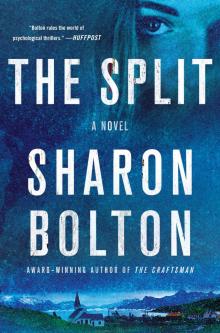 The Split
The Split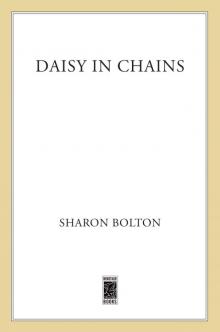 Daisy in Chains
Daisy in Chains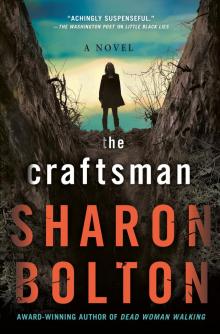 The Craftsman
The Craftsman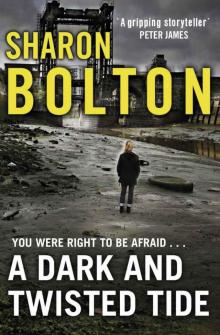 A Dark and Twisted Tide
A Dark and Twisted Tide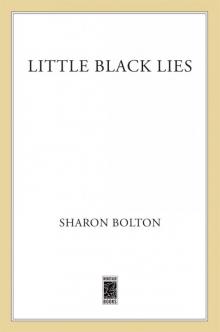 Little Black Lies
Little Black Lies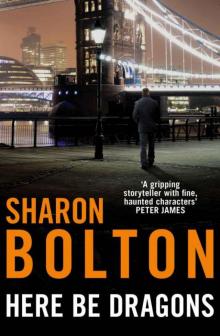 Here Be Dragons: A Short Story
Here Be Dragons: A Short Story Alive
Alive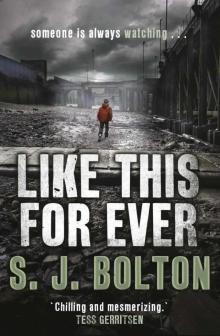 Like This, for Ever
Like This, for Ever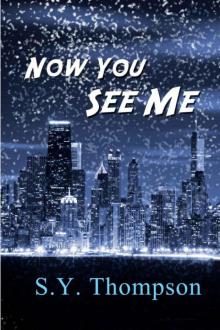 Now You See Me
Now You See Me Sacrifice
Sacrifice